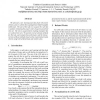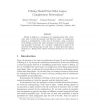1055 search results - page 8 / 211 » order 2002 |
69
Voted
COLING
2002
15 years 19 days ago
2002
To better understand the ordering of clause aggregation operators in a text generation application, we manually annotated a small corpus. The annotated corpus supports the preferr...
ICDM
2002
IEEE
15 years 5 months ago
2002
IEEE
We advocate a new learning task that deals with orders of items, and we call this the Learning from Order Examples (LOE) task. The aim of the task is to acquire the rule that is u...
JSYML
2002
15 years 14 days ago
2002
f orderings provide an abstract framework in which to study spaces of orderings of formally real fields. Spaces of orderings of finite chain length are well understood [9] [12]. Th...
IGPL
2002
15 years 17 days ago
2002
Fibring is defined as a mechanism for combining logics with a firstorder base, at both the semantic and deductive levels. A completeness theorem is established for a wide class of...
96
Voted
CORR
2002
Springer
15 years 18 days ago
2002
Springer
Abstract. Logic Programming paradigms that allow for expressing preferences have drawn a lot of research interest over the last years. Among them, the principle of ordered disjunct...


